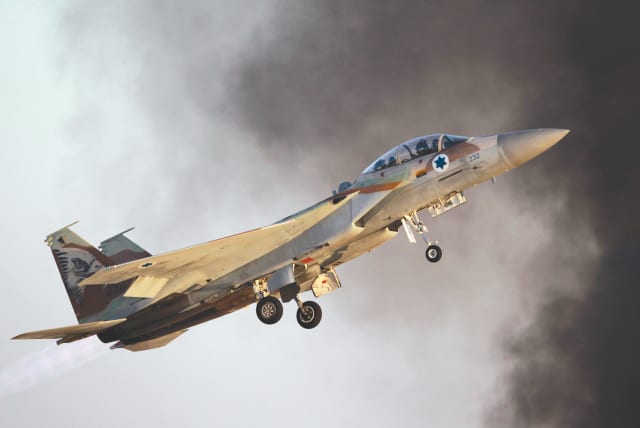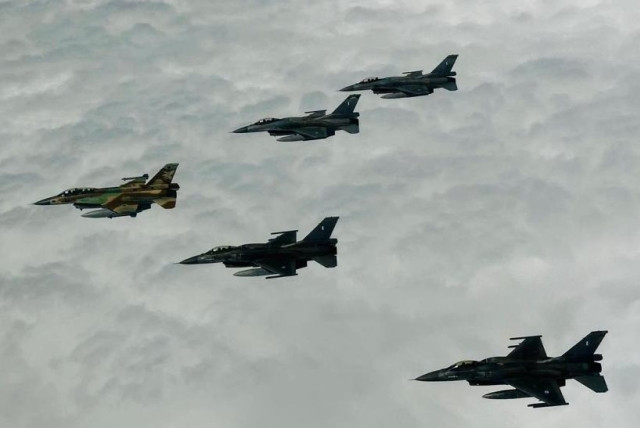A global arms race: Israel's air force seeks post-ceasefire weapons supplies - analysis

Military officials reveal severe strain on Israel's helicopter fleets and fighter jets, while the global arms race complicates procurement efforts.
Israel's biggest challenge after the ceasefire is not in Lebanon but in the United States and Germany.
Israel needs to restore IDF capabilities through massive procurement of weapon systems, fighter jets, helicopters, tanks, artillery, missiles, and various types of ammunition.
The most severe situation in the IDF is in the helicopter array, particularly the Apache squadrons. Regarding ammunition, the IDF is constantly monitoring the quantity of air-to-ground bombs.
The air force's fighter jets have accumulated thousands of flight hours per aircraft during the war, far beyond their planned lifetime - causing aging across all of the force's fighter jets. This will require Israel to expedite the purchase of new squadrons, particularly F-15s and F-35s.
The American administration has recently raised restrictions on aid to Israel, delayed the procurement of heavy air-to-ground bombs and helicopter air-to-ground missiles, and also prevented the supply of used Apache helicopters to temporarily assist the Air Force's defense array.
But the diplomatic crisis between the administration and Israel isn't everything. The world is currently in an arms race. With the war in Ukraine and tensions between China and Taiwan, all of Europe is chasing weapons.
A global arms race
A senior official from one of the world's largest weapons suppliers said, "What's happening now is crazy. This isn't the world we knew two or three years ago. The whole world is buying weapons, everything of everything."
"We're in a reality where this race means weapons companies can't keep up with orders, and the delivery queue keeps getting longer," he added.
Prime Minister Benjamin Netanyahu declared yesterday that the second factor in deciding on a ceasefire is the need to replenish ammunition and equipment.
This is not just to allow renewed ammunition supply but also so that new systems can be purchased now, focusing on fighter jet squadrons, refueling aircraft, and transport helicopters, rather than in four years when the new aid law opens.
Currently, the most difficult situation in the air force is the condition of the Apache helicopters. Their availability level was lacking at the beginning of the war, and due to extensive flight hours, the situation only worsened as the fighting wore on.
Israel urgently needs to renew both squadrons.
One squadron's situation is particularly bad as it uses an older model of the helicopter. During the fighting, Israel requested several used helicopters in good condition from the United States until the purchase of two squadrons would be approved, which was denied by the Americans.
One of the options currently being considered by the Air Force is to take several Black Hawk transport helicopters (called "Yanshuf" in the Air Force), which are used for transport and casualty evacuation, and install weapon systems like air-to-ground missiles, cannons, and additional systems. It would serve as an aerial vehicle for border defense and slightly reduce the need for Apache helicopters.
Heavy and semi-heavy bombs
Shipments of heavy and semi-heavy bombs are stuck in Boeing warehouses in the United States due to President Joe Biden's decision. The same applies to the ‘Hellfire’ missile produced by Lockheed Martin - Israel lacked these munitions when fighting began. An American airlift filled the warehouses in Israel, but as the fighting continued, stocks declined again. Israel is counting on President Trump to immediately release the shipments to Israel.
All Air Force fighter jets performed thousands of flight hours during the war, and their wear is significant.
During the war, the United States even supplied several used aircraft for the Air Force. There's an urgent need to advance the supply of aircraft that were ordered late because Finance Minister Bezalel Smotrich speculated if Israel even needed fighter jets.
A security official estimates that the Air Force will now advance a rapid procurement process that will build Israel's air power, including about one hundred F-35 aircraft, one hundred advanced model F-15 aircraft, and around fifty F-16 aircraft.
The Air Force will request to advance the arrival of refueling aircraft, with the understanding they must purchase at least six more heavy transport helicopters in addition to the 12 helicopters ordered to replace the Yasur helicopter fleet, which has already exceeded their intended flight hours range.
"The big problem right now is that the budget is limited, the blanket is short, and you need to be a magician to meet the needs. And the second issue is the production line schedules that are full with a list of buyers," a security official said.
Jerusalem Post Store
`; document.getElementById("linkPremium").innerHTML = cont; var divWithLink = document.getElementById("premium-link"); if (divWithLink !== null && divWithLink !== 'undefined') { divWithLink.style.border = "solid 1px #cb0f3e"; divWithLink.style.textAlign = "center"; divWithLink.style.marginBottom = "15px"; divWithLink.style.marginTop = "15px"; divWithLink.style.width = "100%"; divWithLink.style.backgroundColor = "#122952"; divWithLink.style.color = "#ffffff"; divWithLink.style.lineHeight = "1.5"; } } (function (v, i) { });

